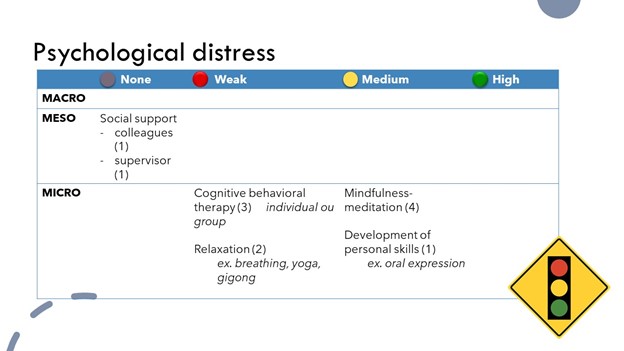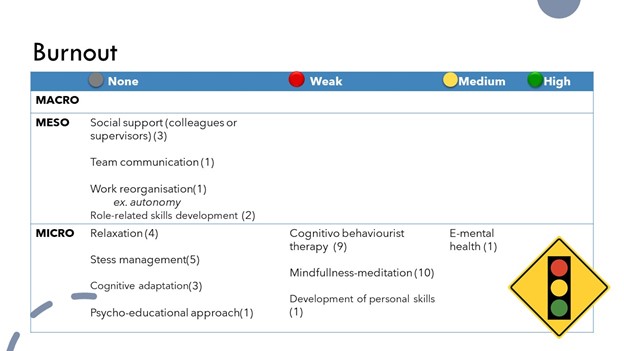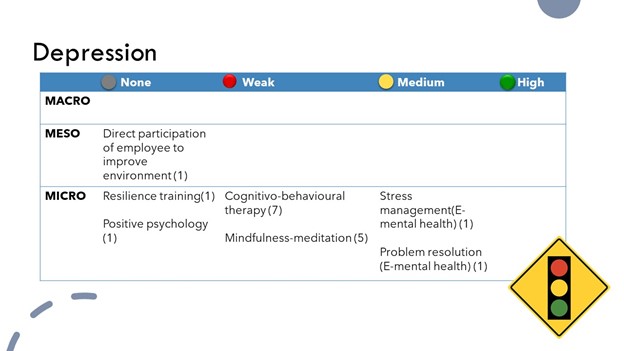FLASH Research: The best practices for intervening and reducing mental health problems in the workplace
The Best Practices Catalog is an online catalogue available on the OSMET website1. It aims to portray the effectiveness of workplace interventions whose main objective is to improve health and well-being of workers based on scientific knowledge. One of the objectives of this catalogue is that it can serve as a toolkit for people who refer to it. Thanks to all the data from the literature, this catalogue could allow organizations to make decisions on how to intervene to improve the health and well-being of their employees.
In order to do this, we adopted a method called systematic review and meta-analysis of meta-analyses. A meta-analysis is a study that combines the results of several individual studies and attempts to reach an overall conclusion. In the case of the catalogue, we listed the meta-analyses that had as a research question to evaluate the effectiveness of certain types of interventions in the workplace in relation to psychological distress, depression, and burnout, and we then grouped them. We used the classification based on the typology of management practices of OSMET which has three levels: a micro level (the interventions are oriented towards the individual), a meso level (the interventions are based on the working conditions), a macro level (interventions emphasize communication and risk regulation)2. Subsequently, we associated a colour code to the degree of strength of the intervention effect based on traffic lights. Thus, an intervention which is weakly effective has a red traffic light, yellow when the effect is medium, and green when the effect is high. Here are our results:
1. Interventions to reduce psychological distress in the workplace

- Interventions based on mindfulness and/or meditation are interventions that are quite effective to a moderate degree;
- An intervention on the development of personal attitudes such as developing one's oral expression to speak better in French and in English has an average degree of effectiveness;
- Interventions based on cognitive-behavioural therapies are interventions that reported a significant, but weak effect;
- Interventions based on relaxation techniques, such as breathing or yoga, also have a weak effect.
- At the level of working conditions, two meta-analyses focused on the improvement of social support either by colleagues or by the superior, but no effect could be detected.
2. Interventions to reduce burnout

- Cognitive-behavioural type therapies and mindfulness or meditation techniques are very numerous in the literature. They seem to reduce the symptoms of burnout, as well as psychological distress, but to a rather low degree.
- Interventions focusing on personal skills development also had a weak effect.
- So-called “E-mental health” interventions offer moderate support for their effectiveness.
- Several other interventions were found to have no effect in reducing burnout problems, both at the level of the individual (e.g., relaxation, stress management, cognitive adaptation) and the conditions of the organization (social support, team communication, development of role-related skills).
3. Interventions to reduce depression

- Cognitive-behavioural therapies, mindfulness, meditation, are the most numerous to be used to reduce depression. However, they show a rather low efficiency.
- Therapies based on technologies that allow remote interventions, especially those focused on stress management or problem solving, have a moderate effect in reducing depressive symptoms.
- Resilience training and positive psychology that work on workers' strengths had no effect in reducing depression.
- The intervention on employee participation in improving the working environment had no effect.
Conclusion
- As this Flash Research demonstrates, there are practices that are effective, but there are not yet enough studies to properly assess the meso dimension;
- Several interventions at the micro level are significant and clearly demonstrate that they are effective, but this effectiveness remains relatively weak or moderate;
- The macro level does not yet seem to have been the subject of enough interventions to carry out a meta-analysis;
- It is widely recognized that the psychological demands of work (workload, pace of work, conflicting demands) are a powerful determinant of mental health damage, but no meta-analysis seems to have been carried out on interventions aimed at this determinant;
- Practices aimed at enhancing direct employee involvement that we have documented with SALVEO and ELOSMET as associated with a lower rate of claims for health problems (SALVEO2) and absenteeism (ELOSMET3) should be developed;
- In the interventions, there is an over-representation of the health sector (nurses, doctors, other health professionals). It would therefore be important to develop interventions in other workplaces.
References:
- https://osmet.openum.ca/en/projets/meilleures-pratiques/
- Marchand, A., Haines, V. Y., Harvey, S., Dextras‐Gauthier, J., and Durand, P. (2016) Health and Stress Management and Mental‐health Disability Claims. Stress & Health, 32: 569–577. doi: 1002/smi.2663.
- Observatoire sur la santé et le mieux-être au travail (october 2020). Absenteeism and workplace health and wellness management practices. Research FLASH Collection, Université de Montréal. https://osmet.openum.ca/en/flash-recherche-labsenteisme-et-les-pratiques-de-gestion-en-sante-et-mieux-etre-au-travail/
Web site: www.osmet.umontreal.ca
About OSMET
The Observatoire sur la santé et le mieux-être au travail (OSMET) was borne of a collaboration between the Faculty of Arts and Sciences, the Institut de recherche en santé publique (now the Centre de recherche en santé publique) and the School of Industrial Relations of the Université de Montréal. OSMET is financially supported by four founding partners: LifeWorks (formerly Morneau Shepell), McKesson Canada, Medavie Blue Cross and Pratt & Whitney Canada.
This content has been updated on 18 July 2023 at 0h15.
